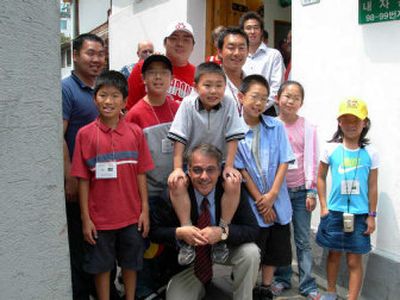Adopted Koreans discover their past

OLYMPIA – Mark Owen went to South Korea in search of his past – the orphanage he lived in as a toddler, the culture he never embraced growing up, even the biological parents who abandoned him at a police station.
Owen, the 32-year-old son of Washington Lt. Gov. Brad Owen, made the pilgrimage with his father, his brother – also adopted from Korea – and several other American families with children adopted from his homeland.
The trip was a goodwill mission to strengthen the ties between the province of Jeollabuk-do and Washington, which have had a sister province/state relationship for nearly a decade.
But mostly, the trip was an opportunity to reintroduce adopted Koreans to their native culture. The Owens joined five other Washington families with seven adopted Korean children, ranging from age 6 to 15.
The group attended the dedication of a new provincial capitol, stayed in homes of local families, went to the Demilitarized Zone that divides South Korea from North Korea, and visited the Seoul offices of Holt International, the agency some of the families went through to adopt their children.
“There were a lot of days I cried,” said Mark Owen, who lives in Yakima. “There was a lot of stuff that was overwhelming. I wish I had done this a lot sooner.”
Mark and his brother, Adam, 28, had been to South Korea only once before – in 1988 on a brief trip with their mother to the Summer Olympics.
Neither Adam nor Mark received all the information they had hoped from their files. Mark found out he was found in a different city than originally believed; Adam received additional photos of himself as a child.
Since the end of the Korean War in the 1950s, South Korea has sent more than 155,000 children abroad for adoption.
For Mary Susan Price, of Edgewood, the trip was a perfect way to show two of her adopted children – 15-year-old Michael and 10-year-old Sarah – something more than she’d been able to provide them at home.
“As much as possible I’ve exposed them to the culture,” Price said. “… But the reality is, we’re Americans living in an American society.”
Brad Owen said he hoped that the trip would help lessen the stigma of adoption in South Korea, as well as allow Koreans adopted by Americans to keep a sense of their history.
“I think it’s important for young people to stay introduced and stay in contact and not have their culture and their ancestry kept from them,” he said.
Owen and his first wife decided to adopt Mark after seeing news coverage of orphaned children in Vietnam. When they went to an international adoption agency, they were told the same situation existed in Korea.
“We just wanted to adopt a child and give them a home,” he said.
Shortly after Mark arrived, they decided to adopt another child from Korea. Adam had been adopted by an American family but put up for adoption by them after they divorced.
Adam Owen said the visit has made him and his wife consider adopting a Korean child.
“With me having that in my background, I think it would help them learn and adjust,” said Adam, who lives in Puyallup.
Adam Pertman, executive director of Evan B. Donaldson Adoption Institute, said these kinds of trips are an important part of an adopted child’s acceptance of who they are.
“Helping kids feel comfortable in their skin is a positive thing,” he said. “I think the biggest benefit is helping to fulfill the need, the desire, to know who you are and where you come from.”